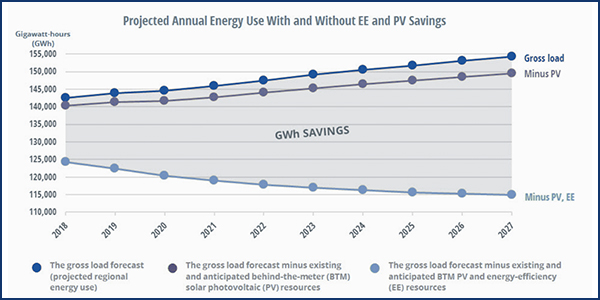By Michael Kuser
Advanced Energy Economy and the Sustainable FERC Project last week petitioned FERC for a declaratory order regarding ISO-NE’s possible attempt to retroactively apply new performance standards that would affect the eligibility of energy efficiency resources participating in the RTO’s capacity market.
The petitioners also asked the commission to clarify the appropriate process for changing the terms of market eligibility for EE resources.
The Feb. 13 filing cited a series of recent phone calls made by ISO-NE staff to Forward Capacity Market participants with qualified EE capacity resources. During those calls, staff members said that the RTO intends to change how it measures the demand reduction value of EE resources for participation in the FCM.
“ISO-NE staff indicated that the ISO may potentially do so retroactively and without seeking commission approval for these changes, even though the contemplated changes could significantly change the quantity of the resources that have already qualified for, and cleared, the most recent Forward Capacity Auction, FCA 13,” the groups said.
The complaint specifically alleges that the changes may include new “net-to-gross” conversion factors to revalue EE resources, factors “never previously required of, nor imposed on, market participants,” nor defined or described in the RTO’s Tariff or manuals.
The petitioners pointed out those factors were not included in most market participants’ FCA 13 measurement and verification documents — “the qualification determinations which were filed with, and have been accepted by, the commission for participation in FCA 13.”
“ISO-NE has created uncertainty about the methodology it will use to calculate demand resource values going forward, and this is causing real and continuing harm to the capacity market,” the petitioners wrote.
The RTO says the discussed changes are not a settled matter.
“We raised the matter of measurement and verification with EE providers recently and intend to have a more full and complete discussion before any changes would be made,” ISO-NE spokesman Matthew Kakley said.
But one key environmental group is skeptical of the RTO’s intent.
“New England’s grid operator is proposing to change the rules midstream and out of the public eye, without explaining what the new rules would be,” said Bruce Ho, a senior advocate at the Natural Resources Defense Council. “This is absurd. Federal regulators need to step in and ensure that energy efficiency resources get a chance to compete fairly in the capacity market. Any changes to the established market rules must be subject to careful consideration and review.”
The two complainants said they filed the petition to “provide greater certainty” to New England EE resources in the near future.
“The measurement and verification changes proposed by ISO-NE in its phone calls would substantially impact the energy efficiency market in New England, reducing the value of energy efficiency resources in the FCM, driving up prices and ultimately forcing ratepayers to pay higher prices,” they said. “Petitioners and our members and partners hope to work cooperatively to address these issues with ISO-NE in the stakeholder process moving forward.”




